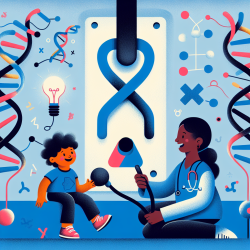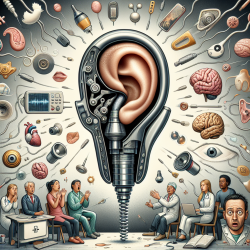Introduction
As practitioners in the field of speech-language pathology and pediatric health, we are constantly on the lookout for innovative solutions that can enhance the wellbeing of children and their caregivers. One such promising avenue is the use of digital health (DH) solutions, which have shown potential in supporting the emotional and self-management needs of caregivers. This blog delves into a recent feasibility study titled "Digital health for emotional and self-management support of caregivers of children receiving growth hormone treatment," exploring how its findings can be applied to improve practitioner skills and outcomes.
The Study at a Glance
The study, conducted by Cervera-Torres et al., focused on caregivers of children undergoing growth hormone treatment (GHt). Recognizing the stress and stigma these caregivers often face, the study explored the usability and feasibility of a mobile DH solution designed to promote emotional and mental wellbeing. This intervention, named Adhera® Caring, incorporates elements of cognitive behavioral therapy (CBT) and mindfulness-based cognitive therapy (MBCT) to support caregivers.
Key Findings and Implications
- Usability and Engagement: The study found that caregivers reported an acceptable usability experience with the DH solution. This suggests that digital tools can be effectively integrated into caregivers' routines without adding undue complexity.
- Emotional and Mental Wellbeing: The intervention demonstrated potential in reducing psychological distress and enhancing positive affect and self-efficacy among caregivers. This is crucial, as improved caregiver wellbeing can lead to better treatment adherence and quality of life for the children.
- Family-Centered Approach: By focusing on the mental health of caregivers, the study underscores the importance of a family-centered approach in pediatric health interventions. This aligns with evidence suggesting that caregiver wellbeing is pivotal in optimizing children's health outcomes.
Applying the Findings in Practice
For practitioners, the study offers several actionable insights:
- Incorporate Digital Tools: Consider integrating digital health solutions into your practice to support caregiver wellbeing. These tools can provide accessible, cost-effective support that complements traditional therapy methods.
- Focus on Caregiver Wellbeing: Acknowledge the critical role of caregiver mental health in treatment outcomes. Implement strategies that address caregiver stress and promote positive affect.
- Promote Self-Management: Encourage caregivers to engage in self-management practices, such as mindfulness and CBT exercises, to enhance their coping skills and resilience.
Encouraging Further Research
While the study provides valuable insights, it also highlights the need for further research. Practitioners are encouraged to explore additional studies that examine the long-term effects of DH interventions and their applicability across different pediatric conditions.
Conclusion
The integration of digital health solutions in supporting caregivers of children undergoing GHt represents a promising step forward in pediatric health care. By leveraging these tools, practitioners can enhance caregiver wellbeing, ultimately leading to better outcomes for children. As we continue to explore the potential of digital health, let us remain committed to data-driven decisions and evidence-based practices that prioritize the needs of children and their families.
To read the original research paper, please follow this link: Digital health for emotional and self-management support of caregivers of children receiving growth hormone treatment: a feasibility study protocol.










